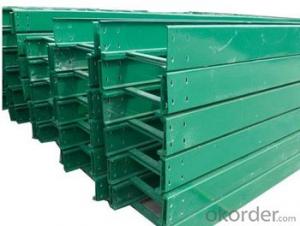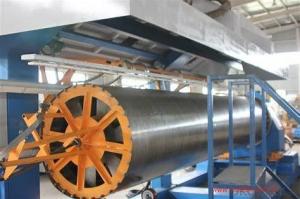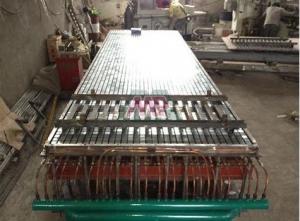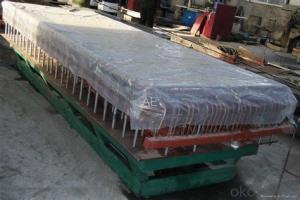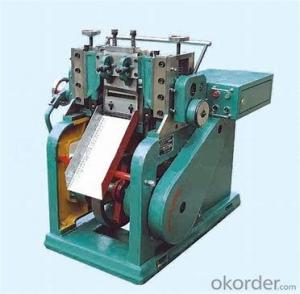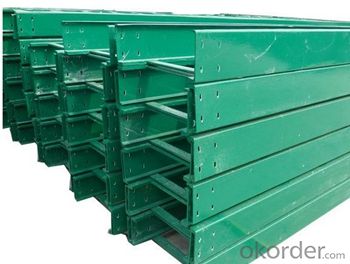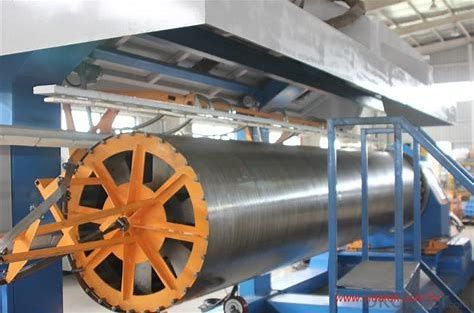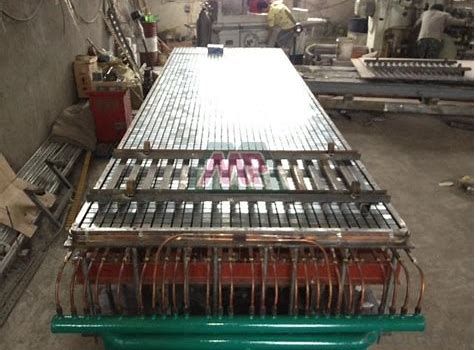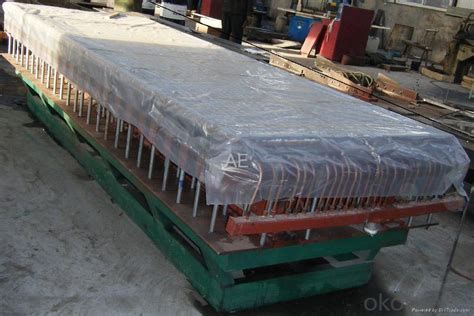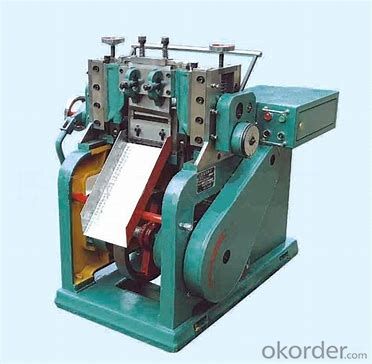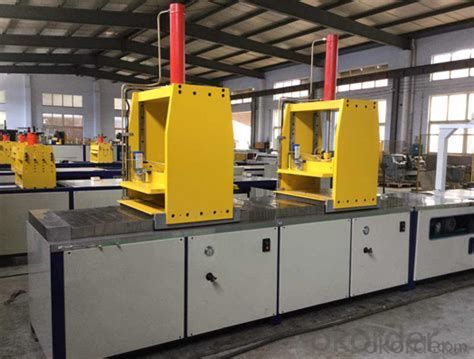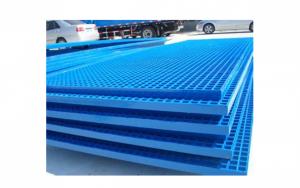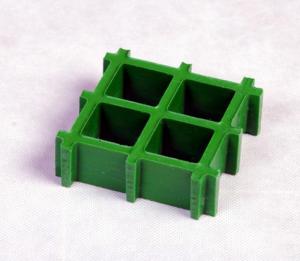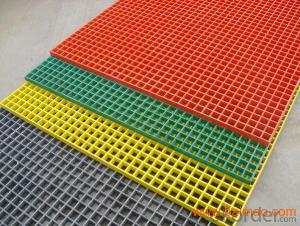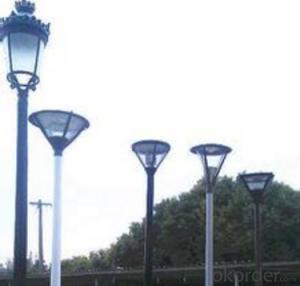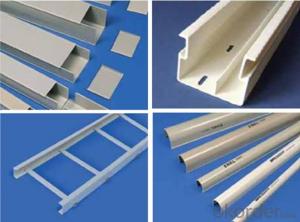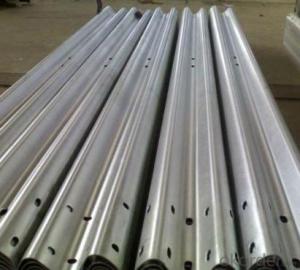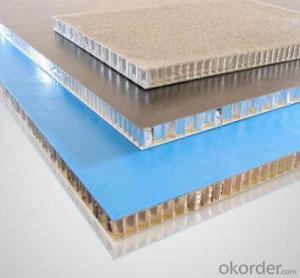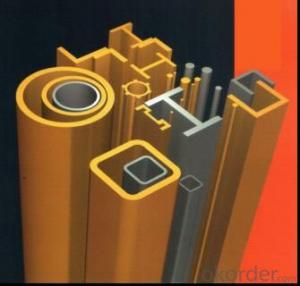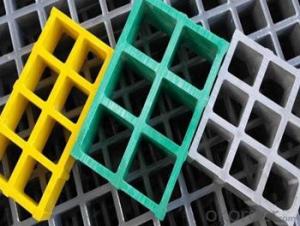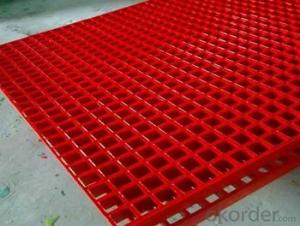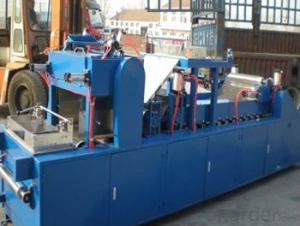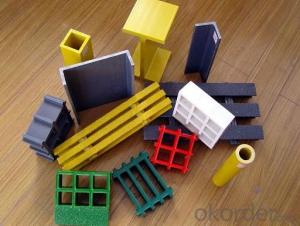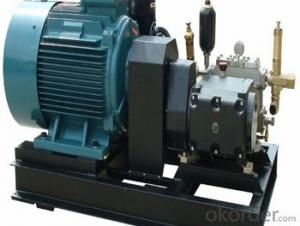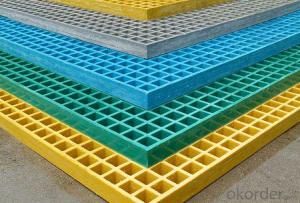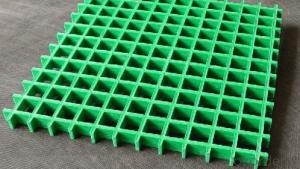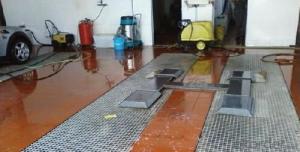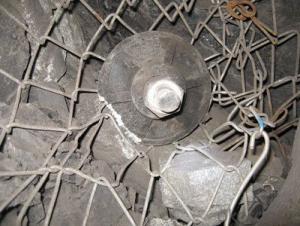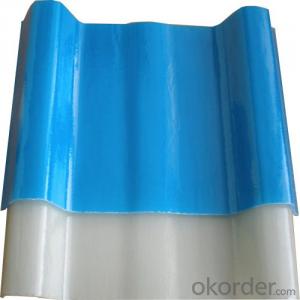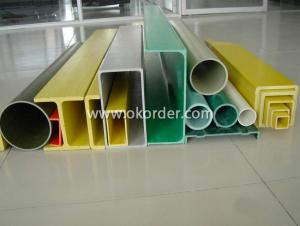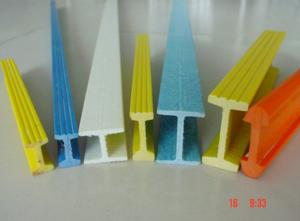FRP Pultrusion Profiles - High Strength FRP Pultruded Gratings and Pultrusion Process of Different Styles Made in China
- Loading Port:
- Tianjin
- Payment Terms:
- TT OR LC
- Min Order Qty:
- 1 m.t.
- Supply Capability:
- 50000 m.t./month
OKorder Service Pledge
OKorder Financial Service
You Might Also Like
PRODUCT DESCRIPTION
Pultruded grating is made by a particular assembly process, which using “I” shape as its main load-bearing and special rod to go through the bearing bar. Pultruded grating include the standard grating and the custom grating, the custom grating can be designed to meet customer’s requirement or special using condition by changing the shape, size and space of the bearing bars, the surface can be covered with lozenge panel, grit panel, or added the anti-slippery sand directly.
FRP pultruded grating has the most characteristics of molded grating, but it has its distinct advantages, it has very high fiberglass content in the loading direction, so it has very high load capability, it has more superiority when used at wide span, so that the basic support will be decreased and the project cost will be reduced accordingly.
SPECIFICATION
The standard space between two crossbars is 6 inch or 12 inch.
Thickness (mm) | Bar width (mm) | Open space (mm) | Open rate (%) | Approx weight (kg/m |
25.4 | 15.2 | 22.8 | 60 | 13.2 |
25.4 | 15.2 | 15.2 | 50 | 15.9 |
25.4 | 15.2 | 10.1 | 40 | 18.5 |
25.4 | 40 | 10.8 | 21 | 14.5 |
38.1 | 15.2 | 22.8 | 60 | 15.8 |
38.1 | 15.2 | 15.2 | 50 | 19.1 |
38.1 | 15.2 | 10.1 | 40 | 22.4 |
50.8 | 25.4 | 25.4 | 50 | 16.6 |
50.8 | 25.4 | 12.7 | 33 | 21.1 |
FEATURES
a. Anti-corrosion and anti-rust
b. Light weight and high strength
c. Anti-flammable
d. Anti- fatigue
e. Safe and anti-slippery
f. Anti-ageing
g. Easy of maintenance
h. Excellent electromagnetism property
i. Good economic benefit
FIELDS SERVED
Sewage treatment,
water supply and drainage,
chemical industry,
oil industry,
power engineering,
pulp and paper,
construction engineering,
spinning, marine engineering.
APPLICATION
Operation terrace,
stair walkway,
ground floor,
trench cover,
sidewalk,
foot bridge,
equipment safety fence,
scaffold.
COMPANT DESCRIPTION
CNBM,China National Building Materials Group is a state-owned enterprise in charge of administrative affairs in china building materials industry. Established in 1984, CNBM is a large group corporation of building materials with total assets of 25 billion RMB and a total staff of 30,000.CNBM now owns 200 subordinating firms of solely owned and joint-venture companies.
CNBM International Corporation is one subsidiary of CNBM, we focus on offering good-quality products,professional service and complete solution to our customers. Strong delivery capacity, advanced technology& management, strong financing capability and excellent after-sale service are our advantages in sharing international market.
PACKAGING & DELIVERY
1.Packaging Details:
plastic film and pallet
2.Delivery Detail:
In 5 days after receiving the down payment
FAQ
Q1.What's your sample policy?
A:We can supply the sample if we have ready parts in stock, but the customers have to pay the courier cost.
Q2.Can you produce according to the samples?
A: Yes, we can produce or modify the products according to your request.
Q3.How do you deliver the goods to my country?
A:We can provide international express, such as DHL, EMS, UPS, FedEx, etc. We select air freight and sea freight upon your requests. Quotations if without mentioning the shipping costs are shipping fee excluded.
Q4.How much does it cost to ship to my country?
A:When you goanna to place an order, please contact us, because different country has different freight.
Q5.How to get the catalogue?
A:please contact us and tell us what you are looking for.
We will try our best to meet customers' demands. Welcome you come here to visit us. We sincerely welcome partners around the world to establish business cooperation with us on the basis of mutual trust, benefit and development.
PICTURES
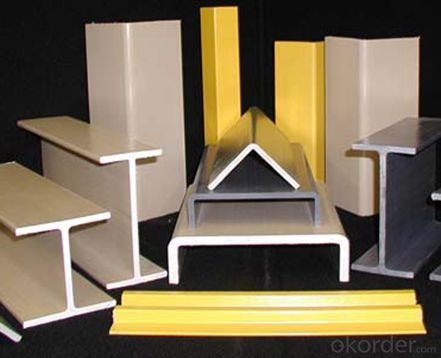
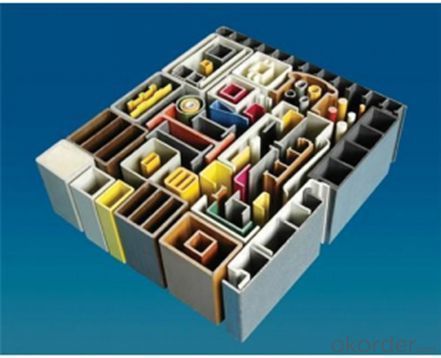
- Q: What is the lifespan of FRP pultrusion profiles?
- The lifespan of FRP (Fiber Reinforced Polymer) pultrusion profiles can vary depending on several factors. Generally, FRP pultrusion profiles have a long lifespan and are known for their durability and longevity. One key factor that influences the lifespan of FRP pultrusion profiles is the quality of the materials used in their construction. High-quality FRP materials, such as those made with premium resins and high-strength fibers, tend to have a longer lifespan compared to lower-quality materials. Additionally, the environmental conditions in which the FRP pultrusion profiles are installed can impact their lifespan. Exposure to extreme temperatures, moisture, UV radiation, chemicals, and mechanical stresses can all affect the performance and lifespan of FRP profiles. Therefore, proper installation and maintenance are crucial to ensuring their longevity. When properly designed, manufactured, and installed, FRP pultrusion profiles can have a lifespan ranging from 25 to 50 years or even longer. However, it is important to note that this estimate can vary depending on the specific application, the level of exposure to harsh conditions, and the overall care and maintenance of the profiles over time. Regular inspections, cleaning, and repairs, if necessary, can help extend the lifespan of FRP pultrusion profiles. Consultation with manufacturers or industry experts can provide more specific information on the expected lifespan of FRP profiles for a particular application or environment.
- Q: Can FRP pultrusion profiles be used in agricultural structures?
- Yes, FRP pultrusion profiles can be used in agricultural structures. FRP (Fiber Reinforced Polymer) pultrusion profiles offer several advantages that make them suitable for agricultural applications. Firstly, FRP profiles are corrosion-resistant, which is crucial in the agricultural industry where structures are exposed to harsh environments and chemicals, such as fertilizers and pesticides. Unlike traditional materials like steel or wood, FRP does not rust or decay, ensuring long-lasting performance in agricultural structures. Secondly, FRP profiles are lightweight yet durable, making them easy to handle and install in agricultural applications. They have high strength-to-weight ratios, allowing for efficient construction and reducing the need for heavy machinery during installation. Additionally, FRP profiles offer excellent mechanical properties such as high stiffness and impact resistance, which are beneficial for agricultural structures that may face heavy loads, vibrations, or impact from machinery. Furthermore, FRP pultrusion profiles can be designed to be UV resistant, preventing degradation from prolonged exposure to sunlight. This makes them suitable for outdoor agricultural structures that are constantly exposed to the elements. Lastly, FRP profiles are non-conductive, which is advantageous in agricultural environments where electrical safety is critical. This property eliminates the risk of electrical hazards associated with conductive materials like steel. Overall, FRP pultrusion profiles provide a reliable and efficient solution for various agricultural structures, such as greenhouse frames, livestock enclosures, irrigation systems, and storage facilities. Their corrosion resistance, lightweight nature, high strength, UV resistance, and non-conductivity make them a suitable choice for agricultural applications.
- Q: Can FRP pultrusion profiles be used in telecommunications towers?
- Telecommunications towers can indeed utilize FRP (Fiber Reinforced Polymer) pultrusion profiles. These profiles possess several advantageous features that render them suitable for this particular application. Firstly, FRP profiles possess a lightweight yet robust nature, facilitating effortless installation and reducing the overall structural weight of telecommunications towers. This characteristic is crucial as it aids in minimizing the burden imposed on the tower structure. Secondly, FRP pultrusion profiles exhibit exceptional resistance to corrosion, making them ideally suited for outdoor applications such as telecommunications towers that are constantly exposed to diverse environmental conditions. Unlike conventional materials like steel or wood, FRP profiles do not succumb to rust, rot, or deterioration when subjected to moisture, UV radiation, or chemicals typically encountered in outdoor environments. Additionally, FRP pultrusion profiles offer excellent electrical insulation properties, a critical aspect for telecommunications towers. These profiles are non-conductive, thereby reducing the likelihood of electrical interference or short circuits that might disrupt the tower's communication systems. Moreover, FRP pultrusion profiles can be produced in various shapes and sizes, thereby enabling customization and meeting the specific design requirements of telecommunications towers. This versatility facilitates seamless integration and compatibility with other components of the tower. Overall, the combination of lightweight composition, high strength, corrosion resistance, electrical insulation, and customization options renders FRP pultrusion profiles an advantageous and viable selection for utilization in telecommunications towers.
- Q: Can FRP pultrusion profiles be customized according to specific requirements?
- FRP pultrusion profiles can be tailored to specific requirements, offering a wide range of customization options. Pultrusion is a manufacturing process that involves pulling continuous fibers through a liquid resin bath and then curing the resin in a heated die to achieve the desired shape. This process allows for flexibility in design and customization. Customization possibilities for FRP pultrusion profiles include dimensions, shapes, colors, and surface finishes. The dimensions can be adjusted to meet specific length, width, and thickness needs. Shapes can vary from basic geometries like rectangular or round profiles to more intricate designs with unique cross-sections. When it comes to color, FRP pultrusion profiles can be pigmented during manufacturing to achieve the desired shade or can be painted or coated afterward. This allows for matching specific color requirements or ensuring compatibility with existing structures or products. Additionally, surface finishes can be personalized to attain desired properties such as enhanced slip resistance, UV resistance, or fire resistance. Specific performance requirements can be met by applying surface treatments like sanding, coating, or adding special additives. Overall, FRP pultrusion profiles offer a high level of customization, making them suitable for various industries including construction, transportation, infrastructure, and aerospace. They are versatile, lightweight, corrosion-resistant, and possess excellent strength-to-weight ratios.
- Q: Can FRP pultrusion profiles be used in the agricultural and farming industry?
- Absolutely, FRP pultrusion profiles are indeed applicable in the agricultural and farming sector. Recognized for their exceptional strength, durability, and corrosion resistance, these profiles are highly suitable for outdoor and challenging environments typically found in this industry. A variety of agricultural and farming applications can benefit from these profiles, including: 1. Fencing and enclosures: By employing FRP pultrusion profiles, strong and enduring fences, gates, and enclosures can be created for safeguarding livestock and crops. These profiles possess resistance against rot, rust, and insect damage, ensuring reliable protection for animals and crops. 2. Structural components: Agricultural buildings, sheds, and greenhouses can utilize FRP pultrusion profiles as structural components. Thanks to their impressive strength-to-weight ratio, lightweight and durable structures can be constructed, capable of withstanding extreme weather conditions. 3. Irrigation systems: FRP pultrusion profiles can be harnessed for the construction of irrigation systems, including pipes, channels, and culverts. These profiles are non-corrosive with a smooth interior surface, reducing friction and improving water flow efficiency. 4. Equipment support and framing: Various agricultural equipment, such as conveyors, platforms, and machinery, can benefit from the support and framing provided by FRP pultrusion profiles. Their superior strength and stiffness make them suitable for heavy-duty applications. 5. Animal housing and equipment: Animal housing and equipment, such as pens, stalls, and feeding troughs, can be constructed using FRP pultrusion profiles. These profiles offer resistance against chemicals, moisture, and UV radiation, resulting in a long lifespan and low maintenance requirements. In conclusion, the outstanding mechanical properties, resistance to environmental factors, and versatility offered by FRP pultrusion profiles make them an excellent choice for the agricultural and farming industry.
- Q: Are FRP pultrusion profiles fire resistant?
- FRP pultrusion profiles exhibit excellent fire resistance due to the combination of reinforcing fibers and the polymer matrix employed in their production. These profiles are crafted through the pultrusion process, wherein reinforcing fibers like fiberglass or carbon fiber are impregnated with a thermosetting resin. This resin undergoes a curing process, resulting in a robust and durable composite material. One of the primary advantages of FRP pultrusion profiles lies in their inherent fire resistance. The thermosetting resin utilized in their manufacture possesses properties that render it highly impervious to fire. When subjected to flames or elevated temperatures, the resin does not easily burn or melt, thereby impeding the propagation of fire. Moreover, the reinforcing fibers present in FRP profiles contribute significantly to their fire resistance. For example, fiberglass, being an inorganic substance, does not combust. It serves as a heat transfer barrier, aiding in the containment of flames. Additionally, FRP pultrusion profiles can be engineered to meet specific fire safety standards and regulations. By incorporating supplementary fire retardant additives or employing specialized resin systems, the fire resistance of these profiles can be further enhanced. It is crucial to note that although FRP pultrusion profiles do possess fire resistance, their precise fire rating may vary depending on the particular composition and design. Thus, it is imperative to consult manufacturers or suppliers who can furnish comprehensive information regarding the fire resistance properties of their FRP pultrusion profiles.
- Q: Are FRP pultrusion profiles resistant to humidity or moisture?
- Yes, FRP pultrusion profiles are highly resistant to humidity or moisture due to their non-porous nature and the use of corrosion-resistant materials.
- Q: Can FRP pultrusion profiles be used in the renewable energy and solar power industry?
- The renewable energy and solar power industry can effectively utilize FRP (Fiber Reinforced Polymer) pultrusion profiles. These profiles possess several key characteristics that make them ideal for such applications. To begin with, the high strength-to-weight ratio of FRP pultrusion profiles is crucial in the renewable energy sector. They are lightweight yet strong, allowing them to withstand various environmental conditions while remaining cost-effective. Additionally, these profiles offer excellent corrosion resistance, ensuring durability and longevity in outdoor and potentially corrosive environments like solar power plants or wind farms. Moreover, FRP pultrusion profiles have outstanding electrical insulation properties, making them suitable for electrical applications commonly found in the renewable energy industry. Furthermore, these profiles can be easily customized into various shapes and sizes, enabling the design and engineering of complex structures required for solar power installations or wind turbine blades. Furthermore, FRP materials are non-conductive and non-magnetic, ensuring their safety for use in electrical and magnetic fields associated with renewable energy systems. In conclusion, FRP pultrusion profiles provide a combination of strength, durability, lightweight, corrosion resistance, and electrical insulation properties that make them highly suitable for use in the renewable energy and solar power industry.
- Q: Are FRP pultrusion profiles resistant to chemicals used in pharmaceutical manufacturing?
- Yes, FRP pultrusion profiles are generally resistant to chemicals used in pharmaceutical manufacturing. The use of high-quality resins and fiberglass reinforcement in the manufacturing process makes FRP pultrusion profiles highly resistant to a wide range of chemicals, acids, and alkalis commonly used in pharmaceutical manufacturing. However, it is always advisable to consult with the manufacturer or supplier to ensure that the specific chemicals used in the manufacturing process are compatible with the FRP profiles.
- Q: Are FRP pultrusion profiles resistant to seismic activity?
- FRP (Fiber Reinforced Polymer) pultrusion profiles are known for their high strength-to-weight ratio and excellent mechanical properties. However, when it comes to seismic activity, their resistance depends on various factors. In general, FRP pultrusion profiles can exhibit good resistance to seismic activity due to their inherent properties. The composite materials used in their construction, such as fiberglass and resin, offer high tensile strength and stiffness, making them capable of withstanding dynamic loads caused by earthquakes. Moreover, FRP pultrusion profiles have been extensively tested and proven to possess excellent fatigue resistance. This property is crucial during seismic events as structures are subjected to repeated dynamic loading. The ability of FRP profiles to withstand cyclic loading without suffering from fatigue failure significantly enhances their seismic resistance compared to traditional materials like steel or concrete. Another advantage of FRP pultrusion profiles in seismic activity is their lightweight nature. Their low weight reduces the overall mass of the structure, resulting in lower seismic forces. This weight reduction can lead to reduced seismic responses and less damage during an earthquake. However, it is important to note that the seismic resistance of FRP pultrusion profiles can be influenced by various factors. These include the design and quality of the profiles, the connection details, and the overall structural system in which they are used. Proper engineering and design considerations must be taken into account to ensure optimal performance and seismic resistance. In conclusion, FRP pultrusion profiles have the potential to offer good resistance to seismic activity due to their high strength, stiffness, and fatigue resistance. However, their performance in seismic events depends on various factors, and careful design and engineering practices are essential to maximize their seismic resistance.
Send your message to us
FRP Pultrusion Profiles - High Strength FRP Pultruded Gratings and Pultrusion Process of Different Styles Made in China
- Loading Port:
- Tianjin
- Payment Terms:
- TT OR LC
- Min Order Qty:
- 1 m.t.
- Supply Capability:
- 50000 m.t./month
OKorder Service Pledge
OKorder Financial Service
Similar products
Hot products
Hot Searches
Related keywords
